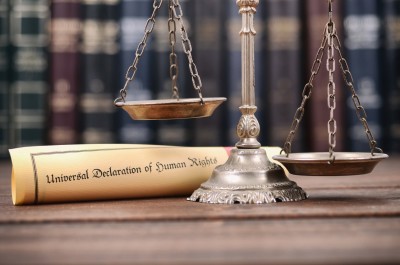Amid the push for faux 'rights,' Human Rights Day reminds us of what matters

On December 10, President Joe Biden followed in the footsteps of his predecessors by recognizing Human Rights Day, an oft-ignored date commemorating a critically important event in world history: the United Nations General Assembly’s adoption of the Universal Declaration of Human Rights (UDHR) in 1948.
Unfortunately, mission creep has plagued U.S. human rights advocacy in recent years, undermining the international human rights standards we have been blessed to inherit. Human Rights Day deserves to be acknowledged because the history of human rights is worth remembering, and its integrity is worth preserving.
The brutality and horrors displayed in World War II and the atrocities committed by Nazi Germany — most notably the Holocaust — demonstrated the need for a widely agreed upon understanding of the ways in which the human dignity of all people must be protected. And so, UN delegate Eleanor Roosevelt led a team of scholars and experts to draft a list of human rights, with regular input from the 58 member states.
This list needed to be such that all reasonable people — from the diverse cultures and norms represented in the UN — would agree to it. In the end, 30 rights and freedoms were agreed upon as being fundamental to humanity, and the UDHR became the guiding force for human rights advocacy.
Christian theologian Albert Mohler points out that the understanding of human rights inherited from Western civilization was “established upon the fact that we know from scripture that every single human being is made in God’s image and thus we are to recognize a dignity in every single human being. And we are to understand that that dignity implies certain God-given rights.”
The inherent worth of humans is what makes human rights important, and according to a Christian worldview, humans are important because they are created in God’s image (Genesis 1:27). Christians understand that the capacity to reason is evidence of this. Article 1 of the UDHR complements this view and lays the groundwork for the rest of the document this way:
"All human beings are born free and equal in dignity and rights. They are endowed with reason and conscience and should act towards one another in a spirit of brotherhood."
Among the rights listed in the UDHR are the right to life, liberty, and security of person (Article 3); the prohibition of slavery and servitude (Article 4); the freedom from arbitrary arrest, detention, or exile (Article 9); the right to own property (Article 17); and the right to freedom of thought, conscience, and religion (Article 18).
Human rights are not granted by governments — they belong to everyone by virtue of their unalienable human dignity. Similarly, international human rights treaties and documents do not bestow rights. They merely reflect a commitment from party countries to respect those rights.
Thus, whenever a government violates human rights, it is acceptable for other governments to use persuasion and pressure to stop that country’s human rights violations. Doing so is not only right but also contributes to “freedom, justice and peace in the world,” as stated in the preamble of the UDHR.
When the U.S. government speaks up on behalf of Christians imprisoned in Pakistan on blasphemy charges or Uyghur Muslims detained in China on the basis of their religious and ethnic identity, this advocacy is not “interference” in domestic politics of these countries. Rather, it upholds basic human rights — the same rights that all people are owed and all governments are obligated to respect.
Sadly, the international human rights project is in crisis. Ever-growing demands for the inclusion of additional “rights” muddle the priorities of human rights advocacy. These new “rights” often compete or conflict with others. And illegitimate claims to human rights have been used to push harmful policies. As former Ambassador-at-Large for International Religious Freedom Sam Brownback recently said, when “everything’s a human right, then nothing’s really a human right.”
Former Secretary of State Mike Pompeo similarly noted, “The bottom line is that more so-called ‘rights’ does not mean more justice. The constitutions of some of the most repressive regimes in history, such as the Soviet Union, promised a multitude of rights to their citizens while the regimes produced ever-climbing death tolls and daily deprivations.” The invention of new “rights” makes human rights advocacy incoherent and distracts from the fundamental rights laid out in the UDHR — the kind that the American Founders might have called “self-evident.”
The UDHR, in addition to founding documents like the Declaration of Independence and Bill of Rights, should anchor the U.S. State Department’s human rights advocacy. Invented “rights” motivated by partisan social agendas cause confusion and untethers U.S. human rights efforts from international human rights law. Instead of looking for new faux rights, the State Department should focus on addressing the multitude of fundamental human rights violations occurring around the world right now.
The “struggle for human rights” that Eleanor Roosevelt referred to is far from over. Just last week, an independent people’s tribunal in the United Kingdom issued a formal judgment finding the Chinese government guilty of crimes against humanity, torture, and genocide. Although the Uyghur Tribunal might have echoes of the Nuremberg Trials of 1945-46, the judgment of the Uyghur Tribunal concerns crimes that are ongoing, not yet relegated to the past. This is a significant moment that will test the free world’s commitment to human rights and the 1948 Genocide Convention that calls parties to the dual responsibility of preventing and punishing genocide.
With the monumental challenges occurring around the world, the stakes are too high to get this wrong. The Biden administration must focus on the rights laid out in the UDHR and avoid distractions. The United States’ leadership on human rights has made a difference in the past, and it still can.
Originally published at the Family Research Council.
Arielle Del Turco is Assistant Director of the Center for Religious Liberty at Family Research Council.



























